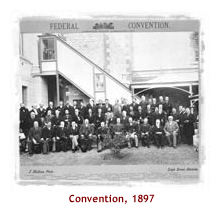 |
Constitutional conventions
 Western
Australia was a reluctant participant in the Australian Constitutional Conventions
of the 1890s. The first major convention to draft a Constitution was in
1890. Economic depression in the eastern colonies and a general loss of
interest after early excitement, delayed further progress. Pressure from
the Australian Natives' Association and other pro-Federation organisations
in Victoria and New South Wales renewed in 1896, leading to sessions of
the Australasian Federal Convention in 1897 and 1898 in Adelaide, Sydney
and Melbourne. Delegates from all the Australian colonies and New Zealand
met to discuss Federation. Western Australia was one of the few colonies
to send representatives appointed by the government rather than delegates
elected by the people. Western
Australia was a reluctant participant in the Australian Constitutional Conventions
of the 1890s. The first major convention to draft a Constitution was in
1890. Economic depression in the eastern colonies and a general loss of
interest after early excitement, delayed further progress. Pressure from
the Australian Natives' Association and other pro-Federation organisations
in Victoria and New South Wales renewed in 1896, leading to sessions of
the Australasian Federal Convention in 1897 and 1898 in Adelaide, Sydney
and Melbourne. Delegates from all the Australian colonies and New Zealand
met to discuss Federation. Western Australia was one of the few colonies
to send representatives appointed by the government rather than delegates
elected by the people.
But for all of the conferences and meetings called by colonial governments
to thrash out an agreement, Western Australians were reluctant to join in
the creation of a new Commonwealth so soon after gaining their own representative
government. The sentiments expressed by a local resident in the following
extract from an 1891 letter to The West Australian sum up the feelings
of the majority of colonists on the west coast throughout the 1890s.
"West Australians possess the spirit of nationalism, but
when its 'cause' assumes a form involving essential alterations in the
nature of the governmental institutions they have but recently acquired,
it is little matter for surprise that few of them should be able to accept
so heavy a demand upon the sentiment of local ambition ...
"Few would oppose federal action applied to purposes of defence -
which in a measure, we are already getting - nor to quarantine and coast
lighting. But what rouses the 'hostility' of some is the wide scope of
the present federation proposals. Why, they say, for instance, should
we hand over our excellent internal post and telegraph service to the
care of a Government thousands of miles away and which could not possibly
be so closely in touch with local wants and feelings as a Cabinet upon
the spot? And why, in particular, should we give to such a Government
supreme control over our customs and immigration policy? The terms we
obtained for such renouncement might be excellent. But would that make
up for a possible serious interference with local trade, production, and
settlement on the part of an outside Parliament and Executive, whose interests
were divergent from ours? The people of Western Australia feel little,
if any, inconvenience from the various tariffs of the eastern colonies,
but they conceive that they might sustain not only inconvenience but loss
and disturbance of their economy from a common tariff formed upon them
by their neighbours. While as for immigration, misgiving tells them that
their own special interests would little affect the policy of East Australia
if she got the West, in this matter, under her thumb. ...
"...our small population stands in a peculiar position to the federal
movement, and the supposed feeling of the people towards it is but what,
in the circumstances, might naturally be expected.
"Yours etc.
"T. COCKBURN CAMPBELL,
"Perth, May 15th, 1891"
|
 |